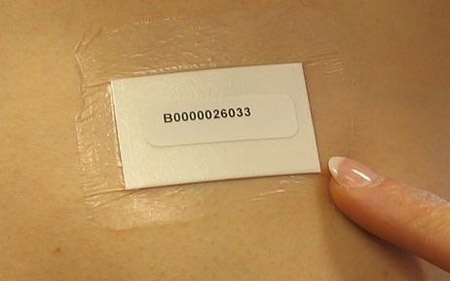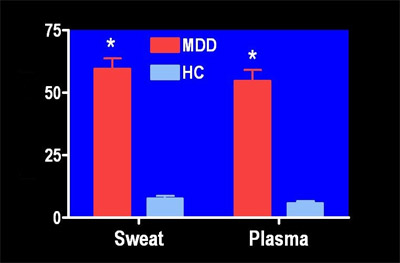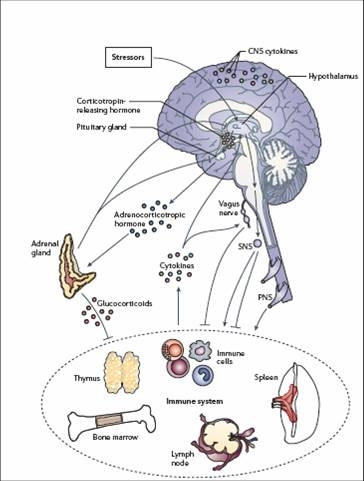Archived Content
The National Institute of Mental Health archives materials that are over 4 years old and no longer being updated. The content on this page is provided for historical reference purposes only and may not reflect current knowledge or information.
Errant Stress/Immune Indicators Detected in Depression-Prone Women’s Sweat
Skin Patch Test Could Predict Risk for Inflammatory Illnesses
• Science Update
An experimental skin patch test detected abnormal levels of markers for immune function and stress in the sweat of women with histories of depression, NIMH researchers say. If confirmed, the non-invasive technique could become an easier alternative to a blood test for predicting risk for inflammatory disorders, such as metabolic syndrome , cardiovascular disease, osteoporosis, and diabetes, which often occur with depression.
"Even though most of them had few symptoms, women with a history of depression showed biomarkers in sweat and blood consistent with a 'fight or flight' stress response," explained Esther Sternberg, M.D., chief of NIMH's Section on Neuroendocrine Immunology and Behavior. Inflammation-related immune messenger chemicals soared as much as five-fold and a nerve chemical that normally acts as a brake on the stress response plummeted, while an adrenalin-like nerve chemical was elevated.
Sternberg and her colleagues published their findings online July 29, 2008 in Biological Psychiatry.
Although similar abnormalities in stress and immune indicators had previously been linked to depression, the new study is the first to demonstrate the feasibility of accurately measuring them in sweat.
In the study, 19 women, most in remission from depression, and 17 healthy controls wore abdominal sweat patches for a day. Variations in marker levels in their sweat correlated strongly with levels in their blood - and also with severity of depression and anxiety symptoms. These changes predispose patients to metabolic syndrome and other inflammatory illnesses, Sternberg said.
In the women with histories of depression, five immune system chemical messengers called cytokines were elevated several-fold, as were three stress-related brain chemicals called neuropeptides. Cytokines regulate neuropeptides and other brain chemicals that control pain, mood and other behaviors altered in depression. A four-fold drop in levels of a neuropeptide called VIP coupled with a rise in an adrenalin-like neuropeptide called NPY signaled a runaway stress response.
Unlike a blood test, which provides a brief snapshot of marker levels at one point in time, the sweat patch test provides a window into these levels over the course of a day. It may also be a more practical way to monitor the patterns in people on-the-go. However, larger studies, with patients both on-and-off antidepressant medications, will be required to confirm the results, and determine whether the method can be applied to other conditions, Sternberg added.
Working with Sternberg on the study were Drs. Giovanni Cizza of the NIH National Institute of Diabetes and Digestive and Kidney Diseases (NIDDK), Terry Phillips of NIBIB, Andrea Marques of NIMH, and other members of the Premenopausal, Osteoporosis Women, Alendronate, Depression (P.O.W.E.R.) Study Group.

Patients may someday receive a sweat patch in the mail, wear it for a day, and then give it to their doctor for analysis of their risk for inflammatory illness.

Levels of IL-1, an immune system chemical messenger known to affect brain function, were five times higher in sweat of mostly asymptomatic women with a history of major depressive disorder (MDD) compared with healthy controls (HC). Levels of the chemical, one of several such cytokines tested, were comparable in sweat and blood, suggesting that the skin patch is a reliable measure of these indicators, which increase risk for metabolic and inflammatory illness.

In response to stress, immune system cells secret chemical messengers called cytokines, which travel to the brain and regulate mood, pain and other behaviors altered in depression. Cytokine levels were significantly elevated in sweat from women with a history of depression- even though most had only mild symptoms. High levels of the chemicals are associated with increased risk for inflammation-related illness.
Reference
Cizza G, Marques AH, Eskandari F, Christie IC, Torvik S, Silverman MN, Phillips TM, Sternberg EM. Elevated Neuroimmune Biomarkers in Sweat Patches and Plasma of Premenopausal Women with Major Depressive Disorder in Remission: The P.O.W.E.R. Study. Biological Psychiatry
